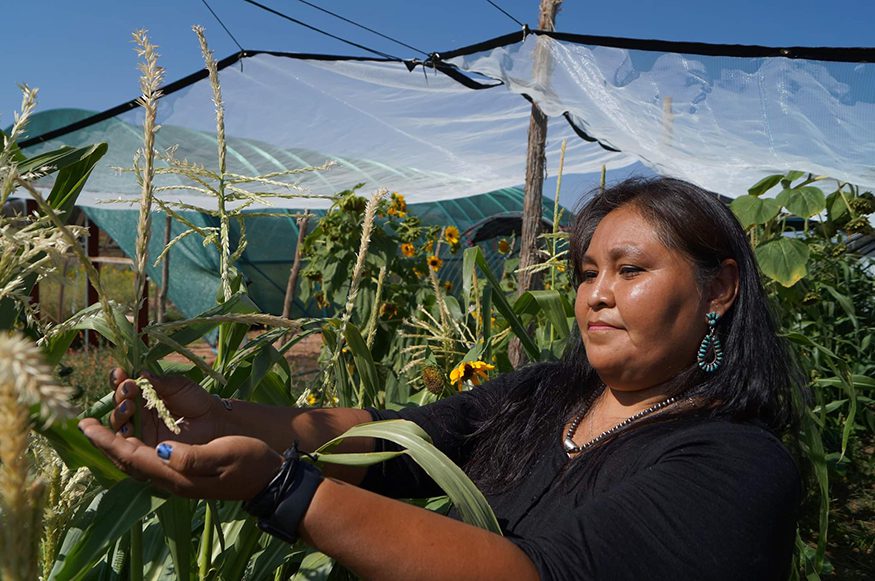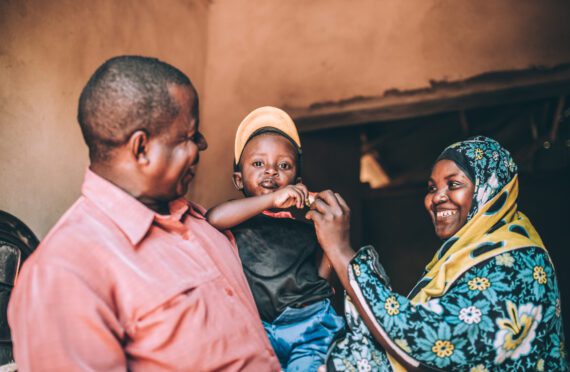By Julie Bautista
Bread for the World believes that our nation will not end hunger until our policies support those who are most vulnerable to it. Native American families are four times as likely as the average U.S. household to report not having enough to eat, largely due to the significant share who live in remote and isolated areas where both jobs and grocery stores are scarce. Although tribes have jurisdiction over millions of acres of land, the crops grown there often are not for local consumption. Native Americans also suffer from dramatic health disparities, among the widest of any U.S. demographic. They are twice as likely as the overall U.S. population to have a health problem linked to poor nutrition.
Despite their disproportionate risk of hunger and diet-linked diseases, Native Americans are largely absent from food policy discussions. Bread for the World’s new project, the Indigenous Farmers’ Dialogue, is designed to elevate Native American voices in our advocacy to end hunger through the upcoming farm bill reauthorization, and to build partnerships with Native American farmers and organizations. It continues and expands Bread’s previous dialogues with Black farmers. Bread’s emphasis on the need for effective food systems to end hunger is in accordance with indigenous agricultural practices, which promote good stewardship of the planet to produce food for all.
Indigenous people are grounded in a philosophy of interconnectedness with the land and the belief that humans do not have dominion over nature or the physical world. Scientific evidence and historical experience show that exploiting the land leads to negative impacts such as pollution and even climate change, all of which are detrimental to human health. Traditional Indigenous knowledge defines this as the connectivity that humans experience.
The land must be sustained properly in order to produce enough nutritious food and achieve food security and justice. However, this cannot be accomplished if systems are functioning instead in the interest of profit accumulation. Over millennia, Native American people have refined techniques that enhance the sustainability and resilience of the agroecosystems they manage. Larger food systems would benefit from applying this knowledge and these practices. Bread is seeking to better understand Indigenous approaches and support Indigenous leaders in their efforts to apply their expertise to broader food systems. Native American voices and approaches are critical to the fight to end hunger.
One initiative taking a sustainable and traditional food production approach is the Agriculture Resource Management Plan (ARMP), a 10-year plan for managing agricultural resources. Tribes can create and implement their own ARMPs or allow the Bureau of Indian Affairs (BIA) to do so on their behalf. Participating in developing their ARMPs gives tribes and individual producers a more direct say in how their resources are conserved and managed. Bread is learning more about the Black Feet Nation ARMP, among whose concerns is addressing inconsistencies in the application process.
The Black Feet Nation ARMP envisions a role as a catalyst for making more land available for sustainable production instead of leasing it to corporations. Reclaiming Native American sovereignty over land is an effective solution to reducing hunger because it takes a sustainable food systems approach. Once land rights are returned, not only are the communities’ experiences illuminated, but they can contribute to lasting solutions to problems such as failures of food systems, environmental degradation, and climate change.
Another organization that is radically changing the international landscape in environmental justice is the Congress of Nations and States, a newly established organization that seeks the participation of Indigenous nations and state governments on an equal political plane. Globally, Indigenous people face serious human rights abuses such as marginalization, forced removal, and denial of land rights. The president of Brazil, Jair Bolsonaro, has engineered the passage of what activists call “a death combo” of environment-related bills that substantially damage the environment, including bills that grant permission for commercial mining on protected Indigenous lands.
This is just one of many examples of times that indigenous people have been the subject of discussions and deliberations without meaningful participation. The Congress of Nations and States aims to create space for Indigenous people to have an opportunity for equal participation. Native lands contain 80 percent of Earth’s biodiversity, and they sustain their environments, making their continued well-being critical for all humanity and in ending hunger.
Julie Bautista is an Emerson Fellow with Bread for the World.



